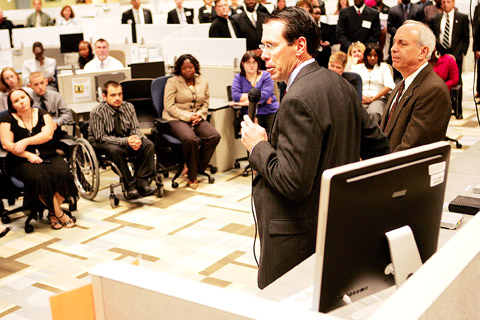The tightening of the global credit markets is crimping the world’s largest telecommunications company.
AT&T Inc chairman and CEO Randall Stephenson said on Tuesday that his company was unable to sell any commercial paper last week for terms longer than overnight.
Commercial paper, which helps lubricate the flow of business operations, is a short-term IOU available to corporations that banks usually know are good for the money.

PHOTO: BLOOMBERG
It’s not that short-term borrowing is unreasonably expensive, Stephenson said.
A shortage of buyers for the debt means such borrowing is not as readily available as it had been even three weeks ago, he said.
“It’s loosened up a bit, but it’s day-to-day right now. I mean literally it’s day-to-day in terms of what our access to the capital markets looks like,” Stephenson said.
AT&T spokesman Larry Solomon said later that as of Tuesday, the company had ready access to the commercial paper market at reasonable rates and various terms.
But as a result of the recent volatility, managers at the Dallas-based phone company are more cautious.
“Your ability to plan for investment is obviously affected. You kind of don’t know what your cost of capital six months from now is going to be,” he said. “We’ll just be very guarded, cautious in terms of where we invest, very guarded and cautious in terms of hiring and capital spending. We’ll see where this situation goes.”
Separately, Microsoft chief executive Steve Ballmer said on Tuesday the global financial crisis would sap consumer and business spending, affecting all companies, including his own.
“Financial issues are going to affect both business spending and consumer spending, and particularly ... spending by the financial services industry,” Ballmer told reporters on the sidelines of a news conference in Oslo.
“We have a lot of business with the corporate sector as well as with the consumer sector and whatever happens economically will certainly effect itself on Microsoft,” he said.
“I think one has to anticipate that no company is immune to these issues,” he said, but declined to be more specific.
Wall Street analysts, on average, expect the Redmond, Washington-based company to generate an 8 percent rise in revenue to just under US$15 billion in its first-quarter ending last month.
“There are parts of our every business which are probably ‘safe’ in the sense that it’s not like our business would go to zero,” he said in an interview.
“On the other hand, when businesses have less money — they can borrow less money, they can spend less money — that can’t be good. When consumers feel the economic pinch, house prices come down. That can’t be good,” Ballmer said.

NATIONAL SECURITY THREAT: An official said that Guan Guan’s comments had gone beyond the threshold of free speech, as she advocated for the destruction of the ROC China-born media influencer Guan Guan’s (關關) residency permit has been revoked for repeatedly posting pro-China content that threatens national security, the National Immigration Agency said yesterday. Guan Guan has said many controversial things in her videos posted to Douyin (抖音), including “the red flag will soon be painted all over Taiwan” and “Taiwan is an inseparable part of China,” while expressing hope for expedited “reunification.” The agency received multiple reports alleging that Guan Guan had advocated for armed reunification last year. After investigating, the agency last month issued a notice requiring her to appear and account for her actions. Guan Guan appeared as required,

Japan and the Philippines yesterday signed a defense pact that would allow the tax-free provision of ammunition, fuel, food and other necessities when their forces stage joint training to boost deterrence against China’s growing aggression in the region and to bolster their preparation for natural disasters. Japan has faced increasing political, trade and security tensions with China, which was angered by Japanese Prime Minister Sanae Takaichi’s remark that a Chinese attack on Taiwan would be a survival-threatening situation for Japan, triggering a military response. Japan and the Philippines have also had separate territorial conflicts with Beijing in the East and South China

A strong cold air mass is expected to arrive tonight, bringing a change in weather and a drop in temperature, the Central Weather Administration (CWA) said. The coldest time would be early on Thursday morning, with temperatures in some areas dipping as low as 8°C, it said. Daytime highs yesterday were 22°C to 24°C in northern and eastern Taiwan, and about 25°C to 28°C in the central and southern regions, it said. However, nighttime lows would dip to about 15°C to 16°C in central and northern Taiwan as well as the northeast, and 17°C to 19°C elsewhere, it said. Tropical Storm Nokaen, currently

PAPERS, PLEASE: The gang exploited the high value of the passports, selling them at inflated prices to Chinese buyers, who would treat them as ‘invisibility cloaks’ The Yilan District Court has handed four members of a syndicate prison terms ranging from one year and two months to two years and two months for their involvement in a scheme to purchase Taiwanese passports and resell them abroad at a massive markup. A Chinese human smuggling syndicate purchased Taiwanese passports through local criminal networks, exploiting the passports’ visa-free travel privileges to turn a profit of more than 20 times the original price, the court said. Such criminal organizations enable people to impersonate Taiwanese when entering and exiting Taiwan and other countries, undermining social order and the credibility of the nation’s